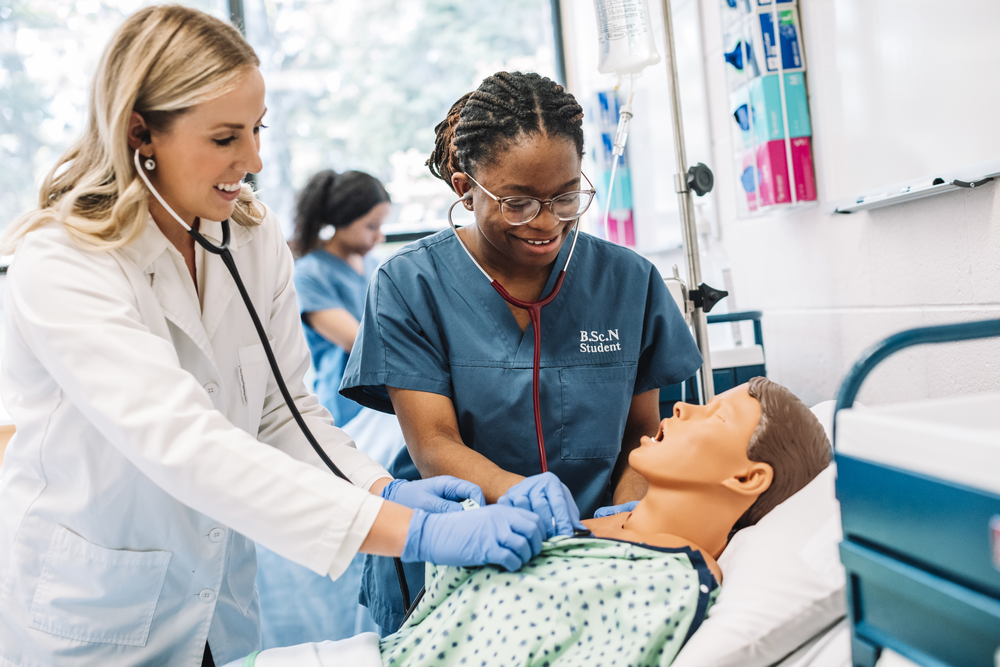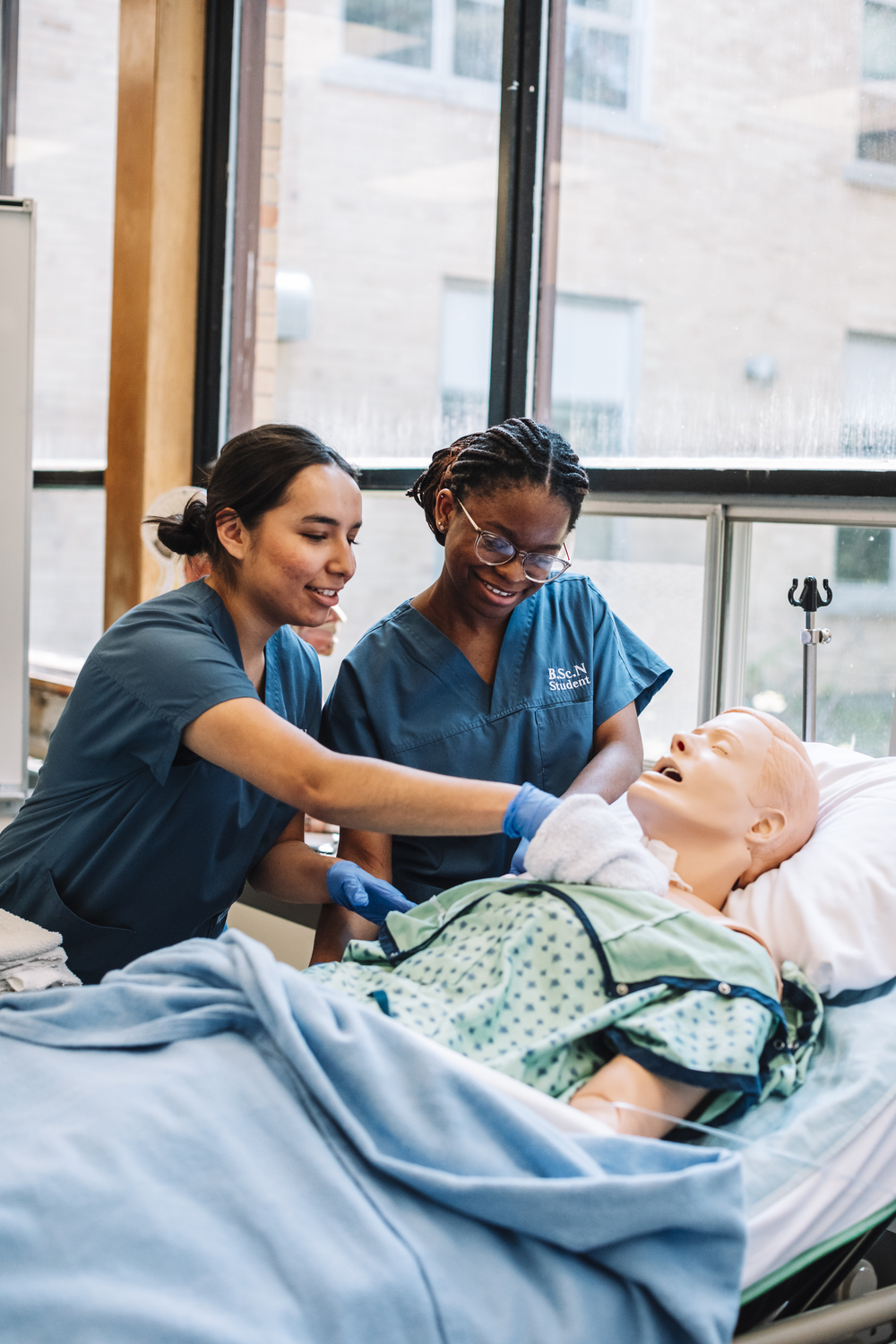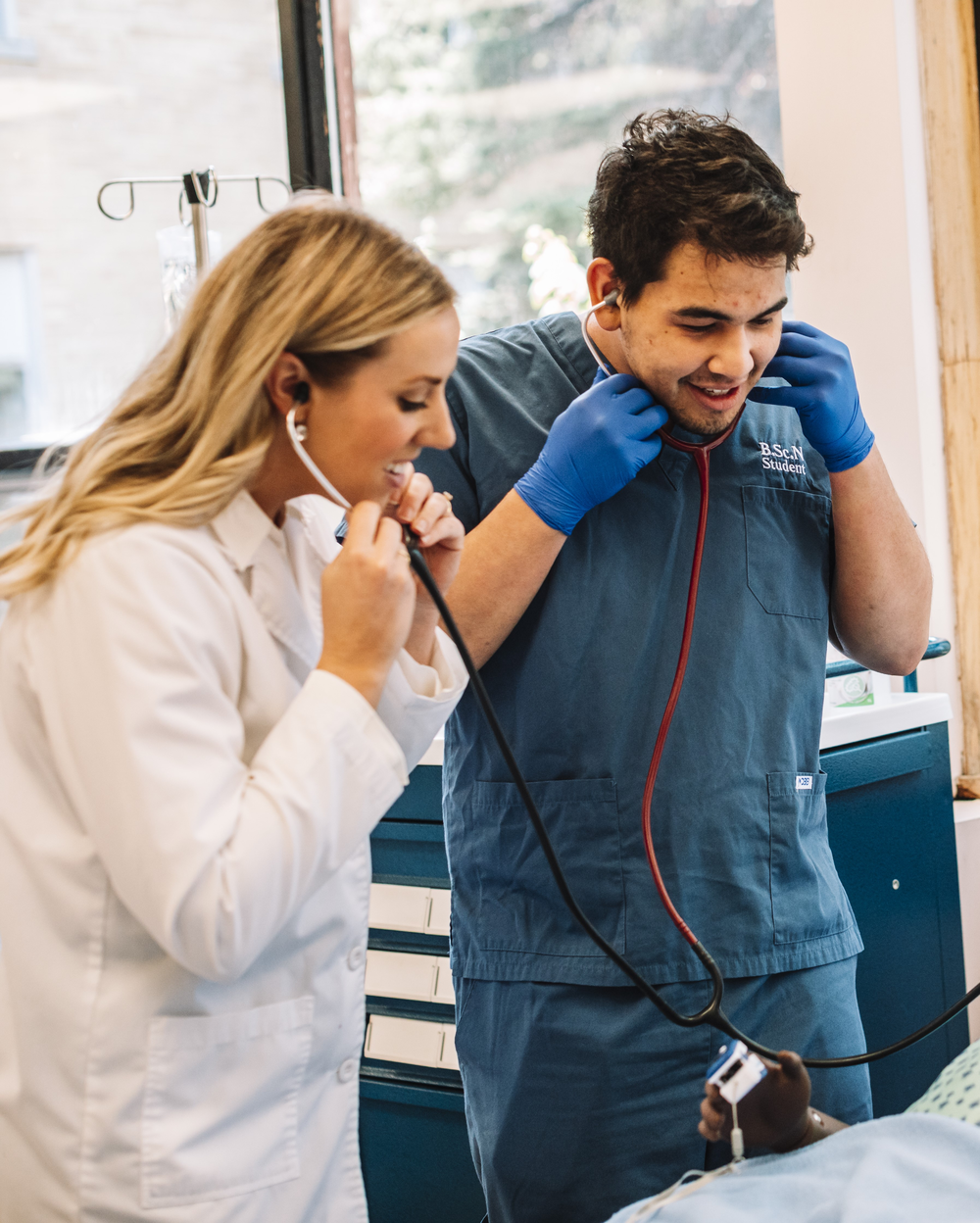Required First Year Courses
| Nursing 1050 Relational Nursing Theory I |
Develops a beginning knowledge base about the history and role of the nurse within the health care system and society. Will include an introduction to principles, concepts, and theories foundational to nursing practice. Particular emphasis is placed on the development of self, caring, and relational practice. Offered in the Fall term only - Lecture - Credit Weight:0.5 |
| Nursing 1051 Relational Nursing Theory II |
Examines the role of self within a broader social context, while the student develops an understanding of the concepts of nursing that promote health. Students will be introduced to the perspectives of health and health promotion, principles of primary health care, and social determinants of health. Offered in the Winter term only - Lecture - Credit Weight:0.5 |
| Nursing 1511 Relational Nursing Practice 1 |
Develops a knowledge base with an emphasis pertaining to the role of self within a professional therapeutic nurse-client relationship. Establishing and developing trust within the therapeutic nurse-client relationship through the use professional therapeutic communication skills will be emphasized within lecture, laboratory, and clinical settings. Offered in the Fall term only - Lecture-Lab - Credit Weight:0.5 |
| Nursing 1512 Relational Nursing Practice 2 |
Building on previously learned concepts students will apply the concepts of functional health patterns in laboratory and clinical settings. Within clinical experiences students will apply the principles, concepts, and theories that promote the health and comfort of clients. Offered in the Winter term only - Lecture-Lab-Clinical - Credit Weight:0.5 |
Nursing 1080 Applied Anatomy and Physiology |
Examines the interrelationships of body organ systems, chemical and cellular aspects, and the normal organization, structure, and function of the human body. The concepts of metabolism, fundamental physiological needs, and homeostasis are introduced. All knowledge is applied to the clinical study of human body systems, including a systematic and holistic approach to body system assessments. Offered as a full year course - Lecture-Lab-Tutorial - Credit Weight:1.0 |
| Nursing 1351 Nursing Inquiry |
Promotes an understanding of professional knowledge in nursing by exploring what constitutes knowledge, information and evidence. A beginning appreciation of qualitative and quantitative research methodologies will be fostered including the development of critical reasoning skills in identifying, consuming, and applying appropriate forms of knowledge and information in nursing practice. Offered in the Winter term only - Lecture - Credit Weight:0.5 |
| Psychology 1100 Introductory Psychology |
This introductory course is designed to provide an appreciation of the scope of psychology and its sub-specialities, to render an understanding of the research-based methods which are fundamental to all aspects of the discipline, to provide an awareness of the biopsychosocial bases of behaviour and to lay the groundwork for further study in psychology. Offered as a full year course - Lecture - Credit Weight:1.0 |
| Mathematics 0212 Quantitative Methods for the Health Scientist |
An introduction to probability; the binomial, poisson and normal distributions; analysis of data; statistical inference; ANOVA; linear regression and correlation; nonparametric methods. Offered in the Fall term - Lecture-Lab - Credit Weight:0.5 |
Required Second Year Courses
| Nursing 2055 Adult Illness Concepts I |
Develops the student’s knowledge and understanding of the pathophysiological concepts of altered health states and application of the nursing process to the care of adults. The emphasis is on clinical manifestations of acute or chronic health alterations, physical assessment, diagnostics, and therapeutic nursing strategies to support clients as they move towards self-management of their health. A lab component offers students the opportunity to practise skills and interventions that promote the health and comfort of individuals. Offered in the Fall term only - Lecture - Credit Weight:0.5 |
| Nursing 2056 Adult Illness Concepts II |
Develops the student’s knowledge and understanding of the pathophysiological concepts of altered health states and application of the nursing process to the care of adults. This course is a continuation of Nursing 2055 - Adult Illness Concepts I. Offered in the Winter term only - Lecture - Credit Weight:0.5 |
| Nursing 2212 Health and Wellness Concepts I |
Develops the student’s understanding of biopsychosocial development across the lifespan and the nursing application of this knowledge across the continuum of care. Concepts of primary health care of the individual and family, diversity, health promotion, health protection and risk reduction, supportive and palliative care are integrated. Offered in the Fall term only - Lecture - Credit Weight:0.5 |
| Nursing 2213 Health and Wellness Concepts II |
Develops the student’s understanding of holistic nursing practice with an emphasis on providing ethical nursing care, which is responsive to diverse needs of patients and families. The focus is on integrating personal and professional values and beliefs in relation to the roles and responsibilities of a professional nurse and as a contributing member of the inter-professional team. Offered in the Winter term only - Lecture - Credit Weight:0.5 |
| Nursing 2511 Relational Nursing Practice 3 |
Laboratory and clinical practice provides the student with the opportunity to build on previously learned knowledge and skills in order to work collaboratively with the patient/client experiencing altered health states in providing supportive care. Offered in the Fall term only - Lab-Clinical - Credit Weight:0.5 |
| Nursing 2520 Relational Nursing Practice 4 |
Provides the student with the opportunity to apply the nursing process in working with adults with altered health states. Students are expected to provide nursing care that supports clients as they progress towards self-management of their health and wellness. In addition to weekly clinical practice, students will complete an integrated two-week clinical practicum. Offered in the Winter term only - Lab-Clinical - Credit Weight:1.0 |
| Nursing 2700 Integrated Nursing Sciences I |
Develops the student’s knowledge and understanding of selected principles and therapies in pharmacology, nutrition and microbiology that affect health and wellness. The focus is on the role and responsibilities of the nurse related to drug classifications, actions, and delivery of medications; healthy diet and nutritional supplements; microbial cell biology and host responses to pathogens; and general issues for patient populations with medical conditions. A lab component offers students the opportunity to practise therapeutic skills to promote or restore health and/or to prevent disease in individuals. Offered as a full year course - Lecture - Credit Weight:1.0 |
Required Third Year Courses
| Nursing 3031 Childbearing Family Theory |
Focuses on the normal physiological changes and nursing care throughout the childbearing continuum from pre-conception through to pregnancy, labor and birth, postpartum and the neonatal period. Additional topics will be covered relevant to childbearing families including reproductive issues, sexually transmitted infections and methods of family planning. High risk obstetric and neonatal conditions will also be covered. Offered in the Fall term for 4-Year BScN students, Spring term for 3-Year Compressed BScN students - Lecture - Credit Weight:0.5 |
| Nursing 3032 Child and Youth Theory |
Focuses on alterations in the health of children and youth within the context of the family. The student will gain an appreciation of the lived experience of children and develop an understanding of the principles, concepts, and challenges unique to their health. The rights of young persons are emphasized through exploration of the fundamental concepts of resilience, social positioning, epigenetics and social justice. Students will develop an understanding of advanced assessment skills and holistic nursing care to address children’s health promotion, restoration and rehabilitation needs. Offered in the Fall term for 4-Year BScN students, Spring term for 3-Year Compressed BScN students - Lecture - Credit Weight:0.5 |
| Nursing 3033 Family Theory |
Focuses on family health nursing within the context of diverse families and communities. Students will explore concepts and theories relevant to the health of individuals and families within the family context. The emphasis will be on the ways in which nurses can promote health and wellness, prevent illness risks, and plan for individualized nursing care tailored to the uniqueness of each family system. Offered in the Winter term for 4-Year BScN students, Fall term for 3-Year Compressed BScN students - Lecture - Credit Weight:0.5 |
| Nursing 3034 Mental Health/Illness Theory |
Develops the student’s knowledge and understanding of the principles, concepts, and therapies that affect health and wellness for clients with the lived experience of acute and/or chronic mental illness. The focus is on the role and responsibilities of the nurse related to recognizing and responding to clinical manifestations of mental illness, holistic assessment of client needs, diagnostics, psychopharmacology, and therapeutic nursing strategies to rehabilitate clients as they move towards optimal health and wellbeing. Offered in the Fall term for 4-Year BScN students, Spring term for 3-Year Compressed BScN students - Lecture - Credit Weight:0.5 |
| Nursing 3035 Complex Care of Older Adults |
Examines concepts and theories relevant to older-adult aging and to the holistic health and function of older persons. Included are the heterogeneity of older adults, normal aging changes, and health-related conditions and their causes. Also examined are environmental and socially constructed conditions that influence gerontological-nursing practice and ultimately older-adult wellbeing. The focus will be on broad approaches to risk identification and protection. Offered in the Fall term for 4-Year BScN students, Spring term for 3-Year Compressed BScN students - Lecture - Credit Weight:0.5 |
| Nursing 3036 Community and Population Nursing |
Expands on the student’s knowledge and understanding of primary health care concepts and their application to community health nursing and population health, and the nurse as part of a multidisciplinary/inter-professional team. The emphasis will be on the role of the nurse in the community using Canadian community health nursing standards and practice and the population health promotion framework. Concepts of healthy public policy, social justice, determinants of health, community assessment and development, program planning and evaluation, epidemiology, health education and empowerment are fundamental concepts. Offered in the Winter term only - Lecture - Credit Weight:0.5 |
| Nursing 3511 Relational Nursing Practice 5 |
Students will complete clinical practice in either childbearing OR child/youth settings, focusing on holistic assessments to recognize normal variations and deviations in these populations, and strategies to promote/protect health. Offered in the Fall term for 4-Year BScN students, Summer term for 3-Year Compressed BScN students - Lab-Clinical - Credit Weight:0.5 |
| Nursing 3512 Relational Nursing Practice 6 |
Provides opportunities to apply the nursing process to adults with acute and/or chronic mental illness conditions. The emphasis of this experience is the continued application of previously learned and newly acquired knowledge and skill in the lab and clinical environment. Students are expected to provide holistic nursing care that supports the rehabilitation of clients as they move towards self-management of their health. Offered in the Winter term for 4-Year BScN students, Summer term for 3-Year Compressed BScN students - Lab-Clinical - Credit Weight:0.5 |
| Nursing 3513 Relational Nursing Practice 7 |
Allows students to examine health-affecting conditions in older-adults more specifically, including causative factors and broad approaches to preventing and intervening in harmful conditions and addressing them if they occur. In clinical experiences with older adults, students will employ knowledge as they respond to the comprehensive and holistic needs of older adults both as individuals and as a population. Offered in the Winter term for 4-Year BScN students, Summer term for 3-Year Compressed BScN students - Lab-Clinical - Credit Weight:0.5 |
Required Fourth Year Courses
The fourth year is divided into four (4) six-week blocks. In either of the Fall Term 6-week blocks, the student will take the three theory courses together, Nursing 4050, 4051, and 4111. In the remaining three 6-week blocks, the student will take each of the clinical courses Nursing 4501, 4502, and 4503.
| Nursing 4050 Nursing Leadership |
Expands the student’s knowledge and understanding of professional autonomy, identity and leadership practices. The focus is on leadership theories, concepts and skills necessary to provide high-quality nursing care. Delegation, decision-making, budgeting and strategies to influence health care policy are addressed. Students will gain knowledge of tools and processes that enhance leadership ability and gain insight into their own leadership style and its impact on others. From a leadership perspective, students will explore a range of ethical values and issues in practice including social justice, health equity, and regulatory issues, recognizing and responding to moral and ethical problems and dilemmas. Offered in the Fall term only - Lecture - Credit Weight:0.5 |
| Nursing 4051 Nursing Research |
Focuses on knowledge acquisition of the research process, including appraisal of evidence, application of quantitative and qualitative methodologies, critical reasoning, and the key steps of the research process. The emphasis will be on evidence informed practice, research and organizational change, research ethics, and an introduction to project management. Offered in the Fall term only - Lecture - Credit Weight:0.5 |
| Nursing 4111 Advanced Topics in Nursing |
Provides students will the opportunity to participate in advanced topic seminars reflecting a range of complex care situations focusing on problem identification and resolution, ethical problem solving within organizational contexts, relational care with individuals, families and communities and within inter-professional teams. Student will have an opportunity to focus in a particular clinical setting to communicate effectively while learning to advocate in a variety of relational contexts. Application of evidence-informed practice will be integrated into classroom discussion, assignments and discourses. Offered in the Fall term only - Lecture - Credit Weight:0.5 |
| Nursing 4501 Relational Nursing Practice 8 |
Provides students with the opportunity to demonstrate integration and synthesis of previously-acquired and new nursing and related knowledge, attitudes and skills in carrying out safe and effective nursing practice in collaboration with the patient/client and the health care team. Offered in the Fall term - Lab-Clinical - Credit Weight:1.0 |
| Nursing 4502 Relational Nursing Practice 9 |
Affords students with the opportunity to demonstrate integration and synthesis of previously-acquired and new nursing and related knowledge, attitudes and skills in carrying out safe and effective nursing practice in collaboration with the patient/client and the health care team. Students’ practice will demonstrate integration of leadership and advocacy concepts. Offered in the Winter term only - Clinical - Credit Weight:1.0 |
| Nursing 4503 Relational Nursing Practice 10 |
Offers students the opportunity to demonstrate integration and synthesis of previously-acquired and new nursing and related knowledge, attitudes and skills in carrying out safe and effective nursing practice within the community health care team and collaboratively with individual patient/client. Offered in the Fall or Winter terms - Virtual Clinical - Credit Weight:1.0 |





